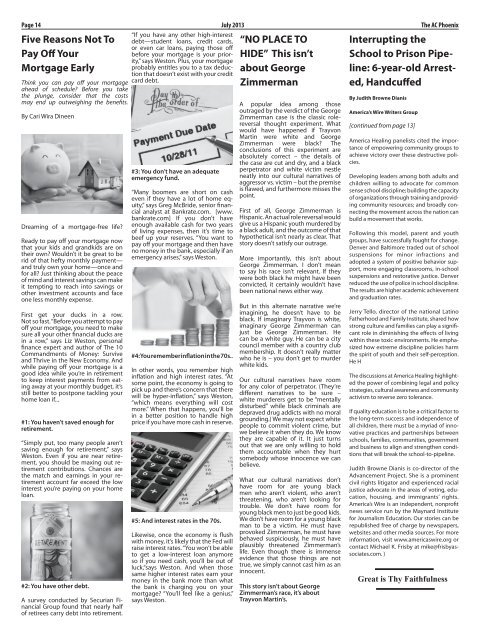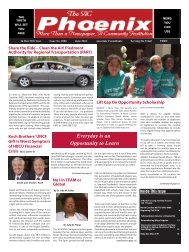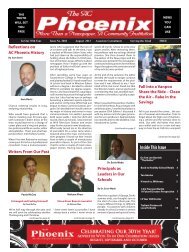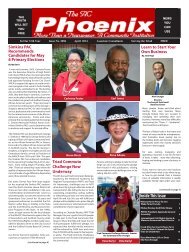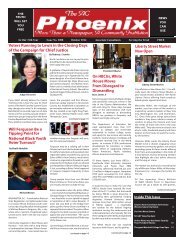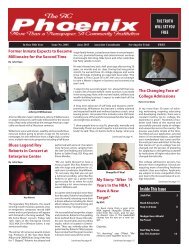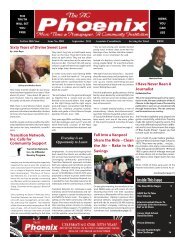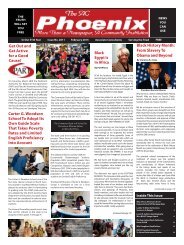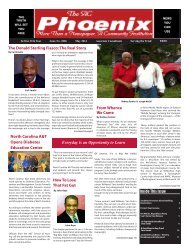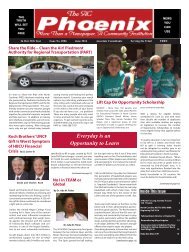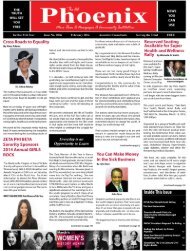The AC Phoenix: More than a Newspaper, a Community Institution -- Issue No. 2001, July 2013
What Black Parents Must do this Summer, By Dr. Jawanza Kunjufu The Business of Sports, By Carl B. Smalls, Morgan Smalls Sports Consultants, LLC Stevie Wonder Boycotts Florida Until 'Stand Your Ground' Law is Abolished, by Andrea Billups A New Leader Takes the Lead at the Children's Home, By John Raye Also Inside This Issue: The State of Equality and Justice in America Interrupting The School to Prison Pipeline Trayvon Matin: A 21st Century Case No Place to Hide Interrupting the School to Prison Pipeline: 6-year-old-Arrested, Handcuffed
What Black Parents Must do this Summer, By Dr. Jawanza Kunjufu
The Business of Sports, By Carl B. Smalls, Morgan Smalls Sports Consultants, LLC
Stevie Wonder Boycotts Florida Until 'Stand Your Ground' Law is Abolished, by Andrea Billups
A New Leader Takes the Lead at the Children's Home, By John Raye
Also Inside This Issue:
The State of Equality and Justice in America
Interrupting The School to Prison Pipeline
Trayvon Matin: A 21st Century Case
No Place to Hide
Interrupting the School to Prison Pipeline: 6-year-old-Arrested, Handcuffed
You also want an ePaper? Increase the reach of your titles
YUMPU automatically turns print PDFs into web optimized ePapers that Google loves.
Page 14 <strong>July</strong> <strong>2013</strong> <strong>The</strong> <strong>AC</strong> <strong>Phoenix</strong><br />
Five Reasons <strong>No</strong>t To<br />
Pay Off Your<br />
Mortgage Early<br />
Think you can pay off your mortgage<br />
ahead of schedule? Before you take<br />
the plunge, consider that the costs<br />
may end up outweighing the benefits.<br />
By Cari Wira Dineen<br />
Dreaming of a mortgage-free life?<br />
Ready to pay off your mortgage now<br />
that your kids and grandkids are on<br />
their own? Wouldn’t it be great to be<br />
rid of that hefty monthly payment—<br />
and truly own your home—once and<br />
for all? Just thinking about the peace<br />
of mind and interest savings can make<br />
it tempting to reach into savings or<br />
other investment accounts and face<br />
one less monthly expense.<br />
First get your ducks in a row.<br />
<strong>No</strong>t so fast. “Before you attempt to pay<br />
off your mortgage, you need to make<br />
sure all your other financial ducks are<br />
in a row,” says Liz Weston, personal<br />
finance expert and author of <strong>The</strong> 10<br />
Commandments of Money: Survive<br />
and Thrive in the New Economy. And<br />
while paying off your mortgage is a<br />
good idea while you’re in retirement<br />
to keep interest payments from eating<br />
away at your monthly budget, it’s<br />
still better to postpone tackling your<br />
home loan if...<br />
#1: You haven’t saved enough for<br />
retirement.<br />
“Simply put, too many people aren’t<br />
saving enough for retirement,” says<br />
Weston. Even if you are near retirement,<br />
you should be maxing out retirement<br />
contributions. Chances are<br />
the match and earnings in your retirement<br />
account far exceed the low<br />
interest you’re paying on your home<br />
loan.<br />
#2: You have other debt.<br />
A survey conducted by Securian Financial<br />
Group found that nearly half<br />
of retirees carry debt into retirement.<br />
“If you have any other high-interest<br />
debt—student loans, credit cards,<br />
or even car loans, paying those off<br />
before your mortgage is your priority,”<br />
says Weston. Plus, your mortgage<br />
probably entitles you to a tax deduction<br />
that doesn’t exist with your credit<br />
card debt.<br />
#3: You don’t have an adequate<br />
emergency fund.<br />
“Many boomers are short on cash<br />
even if they have a lot of home equity,”<br />
says Greg McBride, senior financial<br />
analyst at Bankrate.com. [www.<br />
bankrate.com] If you don’t have<br />
enough available cash for two years<br />
of living expenses, then it’s time to<br />
beef up your reserves. “You want to<br />
pay off your mortgage and then have<br />
no money in the bank, especially if an<br />
emergency arises,” says Weston.<br />
#4: You remember inflation in the 70s..<br />
In other words, you remember high<br />
inflation and high interest rates. “At<br />
some point, the economy is going to<br />
pick up and there’s concern that there<br />
will be hyper-inflation,” says Weston,<br />
“which means everything will cost<br />
more.” When that happens, you’ll be<br />
in a better position to handle high<br />
price if you have more cash in reserve.<br />
#5: And interest rates in the 70s.<br />
Likewise, once the economy is flush<br />
with money, it’s likely that the Fed will<br />
raise interest rates. “You won’t be able<br />
to get a low-interest loan anymore<br />
so if you need cash, you’ll be out of<br />
luck,“says Weston. And when those<br />
same higher interest rates earn your<br />
money in the bank more <strong>than</strong> what<br />
the bank is charging you on your<br />
mortgage? “You’ll feel like a genius,”<br />
says Weston.<br />
“NO PL<strong>AC</strong>E TO<br />
HIDE” This isn’t<br />
about George<br />
Zimmerman<br />
A popular idea among those<br />
outraged by the verdict of the George<br />
Zimmerman case is the classic rolereversal<br />
thought experiment. What<br />
would have happened if Trayvon<br />
Martin were white and George<br />
Zimmerman were black? <strong>The</strong><br />
conclusions of this experiment are<br />
absolutely correct – the details of<br />
the case are cut and dry, and a black<br />
perpetrator and white victim nestle<br />
neatly into our cultural narratives of<br />
aggressor vs. victim – but the premise<br />
is flawed, and furthermore misses the<br />
point.<br />
First of all, George Zimmerman is<br />
Hispanic. An actual role reversal would<br />
give us a Hispanic youth murdered by<br />
a black adult, and the outcome of that<br />
hypothetical isn’t nearly as clear. That<br />
story doesn’t satisfy our outrage.<br />
<strong>More</strong> importantly, this isn’t about<br />
George Zimmerman. I don’t mean<br />
to say his race isn’t relevant. If they<br />
were both black he might have been<br />
convicted, it certainly wouldn’t have<br />
been national news either way.<br />
But in this alternate narrative we’re<br />
imagining, he doesn’t have to be<br />
black. If imaginary Trayvon is white,<br />
imaginary George Zimmerman can<br />
just be George Zimmerman. He<br />
can be a white guy. He can be a city<br />
council member with a country club<br />
membership. It doesn’t really matter<br />
who he is – you don’t get to murder<br />
white kids.<br />
Our cultural narratives have room<br />
for any color of perpetrator. (<strong>The</strong>y’re<br />
different narratives to be sure –<br />
white murderers get to be “mentally<br />
disturbed” while black criminals are<br />
depraved drug addicts with no moral<br />
grounding.) We may not expect white<br />
people to commit violent crime, but<br />
we believe it when they do. We know<br />
they are capable of it. It just turns<br />
out that we are only willing to hold<br />
them accountable when they hurt<br />
somebody whose innocence we can<br />
believe.<br />
What our cultural narratives don’t<br />
have room for are young black<br />
men who aren’t violent, who aren’t<br />
threatening, who aren’t looking for<br />
trouble. We don’t have room for<br />
young black men to just be good kids.<br />
We don’t have room for a young black<br />
man to be a victim. He must have<br />
provoked Zimmerman, he must have<br />
behaved suspiciously, he must have<br />
plausibly threatened Zimmerman’s<br />
life. Even though there is immense<br />
evidence that those things are not<br />
true, we simply cannot cast him as an<br />
innocent.<br />
This story isn’t about George<br />
Zimmerman’s race, it’s about<br />
Trayvon Martin’s.<br />
Interrupting the<br />
School to Prison Pipeline:<br />
6-year-old Arrested,<br />
Handcuffed<br />
By Judith Browne Dianis<br />
America’s Wire Writers Group<br />
[continued from page 13]<br />
America Healing panelists cited the importance<br />
of empowering community groups to<br />
achieve victory over these destructive policies.<br />
Developing leaders among both adults and<br />
children willing to advocate for common<br />
sense school discipline; building the capacity<br />
of organizations through training and providing<br />
community resources; and broadly connecting<br />
the movement across the nation can<br />
build a movement that works.<br />
Following this model, parent and youth<br />
groups, have successfully fought for change.<br />
Denver and Baltimore traded out of school<br />
suspensions for minor infractions and<br />
adopted a system of positive behavior support,<br />
more engaging classrooms, in-school<br />
suspensions and restorative justice. Denver<br />
reduced the use of police in school discipline.<br />
<strong>The</strong> results are higher academic achievement<br />
and graduation rates.<br />
Jerry Tello, director of the national Latino<br />
Fatherhood and Family Institute, shared how<br />
strong culture and families can play a significant<br />
role in diminishing the effects of living<br />
within these toxic environments. He emphasized<br />
how extreme discipline policies harm<br />
the spirit of youth and their self-perception.<br />
He H<br />
<strong>The</strong> discussions at America Healing highlighted<br />
the power of combining legal and policy<br />
strategies, cultural awareness and community<br />
activism to reverse zero tolerance.<br />
If quality education is to be a critical factor to<br />
the long-term success and independence of<br />
all children, there must be a myriad of innovative<br />
practices and partnerships between<br />
schools, families, communities, government<br />
and business to align and strengthen conditions<br />
that will break the school-to-pipeline.<br />
Judith Browne Dianis is co-director of the<br />
Advancement Project. She is a prominent<br />
civil rights litigator and experienced racial<br />
justice advocate in the areas of voting, education,<br />
housing, and immigrants’ rights.<br />
America’s Wire is an independent, nonprofit<br />
news service run by the Maynard Institute<br />
for Journalism Education. Our stories can be<br />
republished free of charge by newspapers,<br />
websites and other media sources. For more<br />
information, visit www.americaswire.org or<br />
contact Michael K. Frisby at mike@frisbyassociates.com.<br />
)<br />
Great is Thy Faithfulness


